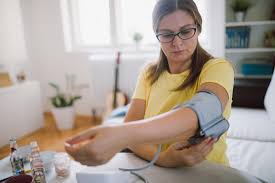Source:timescolonist.com
Dear Dr. Roach:
I read on the internet that you should take your blood-pressure medicine at night. I just recently started taking medicine for my blood pressure and my instructions were to take it first thing in the morning. So, when is the best time to take it?
A study published last October showed that, as a group, people who were told to take all their high blood pressure medicines at night had surprisingly fewer bad events (heart attack, heart failure, stroke, procedure to open heart blood vessels or death due to cardiovascular causes) than people who were told to take their medicines in the morning. Subjects in the study could be taking any of the major types of blood-pressure medicines that are normally given once daily.
The reason those who took their medicines at night did so much better might be related to normal physiology. During sleep, the blood pressure normally dips down. In some people, there is a diminished “dip” or even the opposite occurs — a rise in blood pressure. Taking blood-pressure medicine at nighttime restored or enhanced the normal response. In addition, blood pressure normally rises around 6 in the morning, timed with an increase in the blood levels of the hormone cortisol. This is the peak time for heart attacks. It’s possible that having protection from high blood pressure at this time from taking it at night could help prevent heart attacks. That’s opposed to those taking it during the day; at 6 a.m., the medicine is wearing off and protection is at its lowest.
The findings in the study are dramatic. There was a 45% relative risk reduction in the number of people who had any of the bad outcomes studied. This translates to about one person in 18 over the six years of the study not getting an event, or an absolute risk reduction of just over five per cent.
Some of my colleagues have already started telling their patients to change the time they take their blood pressure medicines to nighttime. I would caution against doing so without talking to your doctor. I would also add that taking diuretics at bedtime can cause some people to have to get up during the night.
Dear Dr. Roach: I had a skin blemish removed by burning at a dermatologist office. One wouldn’t seem to heal and a follow-up to the dermatologist with a biopsy found it to be a keratoacanthoma. I am not scheduled for a return visit as there was treatment during the time of the biopsy. What is the prognosis for this type of condition?
A.A.
Experts argue whether keratoacanthoma is a benign tumour (which can sometimes go away by itself) or a skin cancer that can rarely spread to other locations. However, since it can be difficult or impossible to tell the difference between keratoacanthoma and squamous cell cancer of the skin, I think surgical removal is the most appropriate treatment.
If the tumour was completely removed during biopsy, then your prognosis is excellent. However, 3% to 8% of keratoacanthomas recur after biopsy. You should definitely see your dermatologist immediately if you see signs of regrowth at the site of biopsy.
Otherwise, I would recommend a return visit to the dermatologist in six months for a complete skin exam as well as to let the dermatologist look at the biopsy site.
